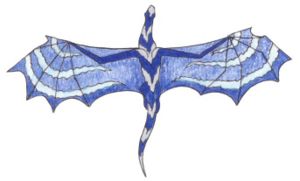Difference between revisions of "Pecheur-Raye"
From TemeraireWiki
m |
m |
||
| Line 3: | Line 3: | ||
== Species Notes == | == Species Notes == | ||
| − | The Pecheur-Rayé (which translates as "striped fisherman") was one of the two most common French dragon breeds (the other being the [[Pecheur-Couronne]]). Sir [[Edward Howe]] has noted that both of these breeds "are more closely related to the Widowmaker breed than to the | + | The Pecheur-Rayé (which translates as "striped fisherman") was one of the two most common French dragon breeds (the other being the [[Pecheur-Couronne]]). Sir [[Edward Howe]] has noted that both of these breeds "are more closely related to the [[Grey Widowmaker|Widowmaker]] breed than to the [[Yellow Reaper|Reaper]]s, in we may judge by wing confirmation and the structure of the breast-bone, which in both breeds is keeled and fused with the clavicle. This anatomical peculiarity renders them both more useful for breeding down into light-combat and courier breeds, rather than into heavy-combat breeds." |
[[Category:A-Z]] | [[Category:A-Z]] | ||
[[Category:Dragon Breeds]] | [[Category:Dragon Breeds]] | ||
Revision as of 21:28, 17 October 2008
Dragon Breed Data
| Breed Name: | Pecheur-Raye |
| National Loyalty: | French |
| Physical Characteristics: | |
| Special Abilities: | |
| Known Members: |
Species Notes
The Pecheur-Rayé (which translates as "striped fisherman") was one of the two most common French dragon breeds (the other being the Pecheur-Couronne). Sir Edward Howe has noted that both of these breeds "are more closely related to the Widowmaker breed than to the Reapers, in we may judge by wing confirmation and the structure of the breast-bone, which in both breeds is keeled and fused with the clavicle. This anatomical peculiarity renders them both more useful for breeding down into light-combat and courier breeds, rather than into heavy-combat breeds."
